八年级上册unit1不定代词的用法
- 格式:ppt
- 大小:199.00 KB
- 文档页数:7
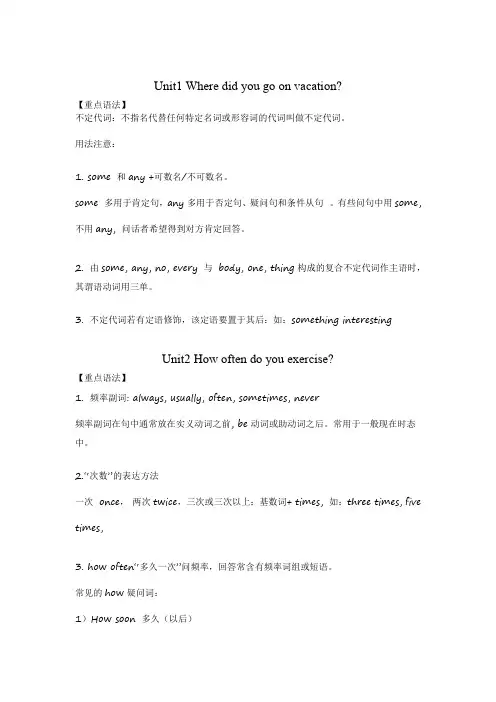
Unit1 Where did you go on vacation?【重点语法】不定代词:不指名代替任何特定名词或形容词的代词叫做不定代词。
用法注意:1. some 和any +可数名/不可数名。
some 多用于肯定句,any多用于否定句、疑问句和条件从句。
有些问句中用some,不用any, 问话者希望得到对方肯定回答。
2. 由some, any, no, every 与body, one, thing构成的复合不定代词作主语时,其谓语动词用三单。
3. 不定代词若有定语修饰,该定语要置于其后:如:something interestingUnit2 How often do you exercise?【重点语法】1. 频率副词: always, usually, often, sometimes, never频率副词在句中通常放在实义动词之前, be动词或助动词之后。
常用于一般现在时态中。
2.“次数”的表达方法一次once,两次twice,三次或三次以上:基数词+ times, 如:three times, five times,3. how often“多久一次”问频率,回答常含有频率词组或短语。
常见的how疑问词:1)How soon 多久(以后)—How soon will he be back?他多久能回来?—He will be back in a month. 他一个月后能回来。
2)how long “多久”—How long did it take you to clean the house? 你打扫房子用了多久?—It took me half an hour to clean the house. 我打扫这房子用了半小时。
3)How many+名复How much+不可名“多少” 问数量(how much 还可问价格)Unit3 I’m more outgoing than my sister.【重点语法】1. 形容词和副词的比较等级(1)形容词和副词的原形就是原级(2)比较级,表示较……或更……(3)最高级,表示最…。
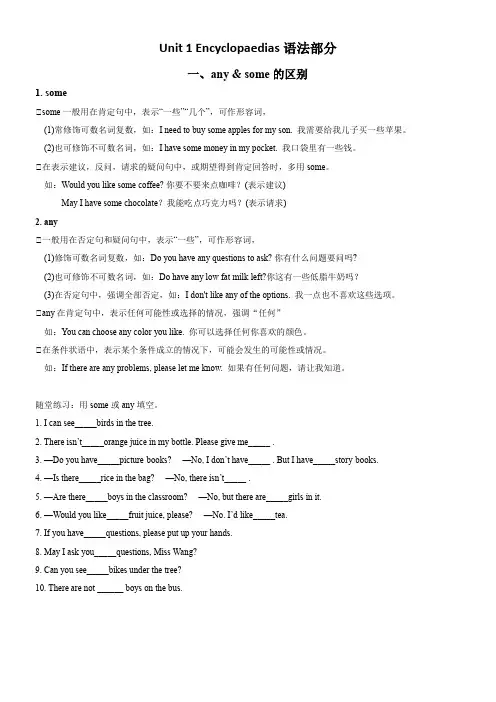
Unit 1 Encyclopaedias语法部分一、any & some的区别1. some①some一般用在肯定句中,表示“一些”“几个”,可作形容词,(1)常修饰可数名词复数,如:I need to buy some apples for my son. 我需要给我儿子买一些苹果。
(2)也可修饰不可数名词,如:I have some money in my pocket. 我口袋里有一些钱。
①在表示建议,反问,请求的疑问句中,或期望得到肯定回答时,多用some。
如:Would you like some coffee?你要不要来点咖啡?(表示建议)May I have some chocolate?我能吃点巧克力吗?(表示请求)2. any①一般用在否定句和疑问句中,表示“一些”,可作形容词,(1)修饰可数名词复数,如:Do you have any questions to ask?你有什么问题要问吗?(2)也可修饰不可数名词,如:Do have any low fat milk left?你这有一些低脂牛奶吗?(3)在否定句中,强调全部否定,如:I don't like any of the options. 我一点也不喜欢这些选项。
①any在肯定句中,表示任何可能性或选择的情况,强调“任何”如:You can choose any color you like. 你可以选择任何你喜欢的颜色。
①在条件状语中,表示某个条件成立的情况下,可能会发生的可能性或情况。
如:If there are any problems, please let me know. 如果有任何问题,请让我知道。
随堂练习:用some或any填空。
1. I can see_____birds in the tree.2. There isn’t_____orange juice in my bottle. Please give me_____ .3. —Do you have_____picture-books?—No, I don’t have_____ . But I have_____story-books.4. —Is there_____rice in the bag?—No, there isn’t_____ .5. —Are there_____boys in the classroom?—No, but there are_____girls in it.6. —Would you like_____fruit juice, please?—No. I’d like_____tea.7. If you have_____questions, please put up your hands.8. May I ask you_____questions, Miss Wang?9. Can you see_____bikes under the tree?10. There are not ______ boys on the bus.二、复合不定代词1.构成2.区别(1)something,somebody,someone通常用于肯定句;anything,anyone,anybody通常用于否定句、一般疑问句或条件状语从句中。
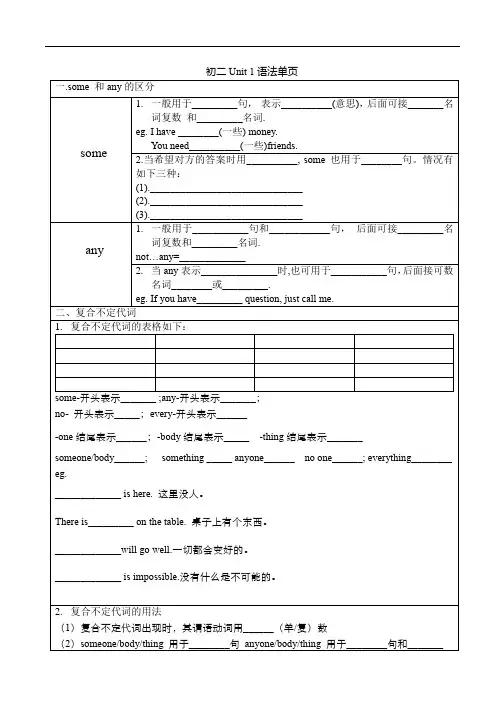
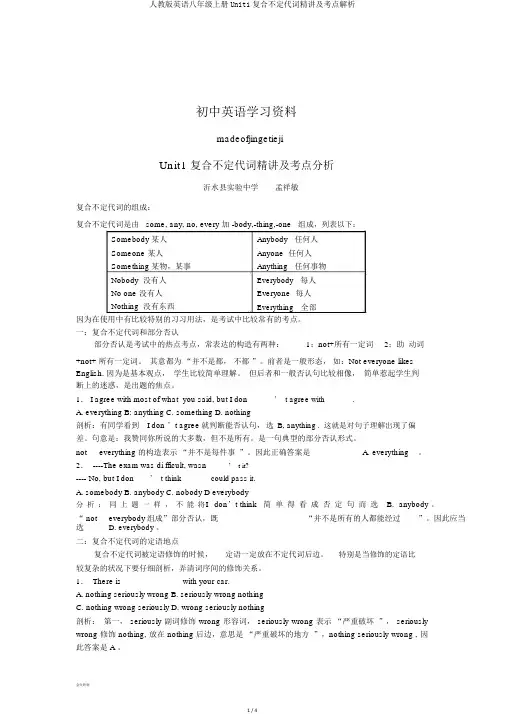
初中英语学习资料madeofjingetiejiUnit1 复合不定代词精讲及考点分析沂水县实验中学孟祥敏复合不定代词的组成:复合不定代词是由 some, any, no, every 加 -body,-thing,-one 组成,列表以下:Somebody 某人Anybody 任何人Someone 某人Anyone 任何人Something 某物,某事Anything 任何事物Nobody 没有人Everybody 每人No one 没有人Everyone 每人Nothing 没有东西Everything 全部因为在使用中有比较特别的习习用法,是考试中比较常有的考点。
一:复合不定代词和部分否认部分否认是考试中的热点考点,常表达的构造有两种:1:not+所有一定词2:助动词+not+ 所有一定词。
其意都为“并不是都,不都”。
前者是一般形态,如:Not everyone likesEnglish. 因为是基本观点,学生比较简单理解。
但后者和一般否认句比较相像,简单惹起学生判断上的迷惑,是出题的焦点。
1. I agree with most of what you said, but I don’ t agree with ______.A. everything B: anything C. something D. nothing剖析:有同学看到I don ’t agree就判断能否认句,选B, anything .这就是对句子理解出现了偏差。
句意是:我赞同你所说的大多数,但不是所有。
是一句典型的部分否认形式。
not everything 的构造表示“并不是每件事”。
因此正确答案是 A. everything。
2. ----The exam was di fficult, wasn’ t it?---- No, but I don’ t think ______ could pass it.A. somebodyB. anybodyC. nobody D everybody分析:同上题一样,不能将I don’t think简单得看成否定句而选 B. anybody 。
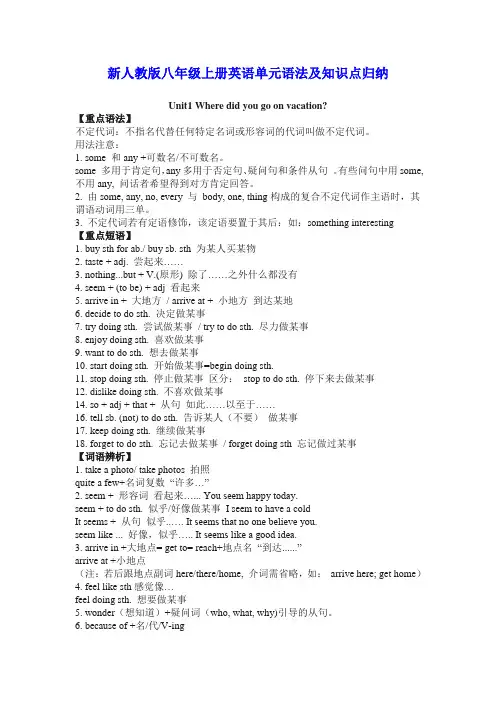
新人教版八年级上册英语单元语法及知识点归纳Unit1 Where did you go on vacation?【重点语法】不定代词:不指名代替任何特定名词或形容词的代词叫做不定代词。
用法注意:1. some 和any +可数名/不可数名。
some 多用于肯定句,any多用于否定句、疑问句和条件从句。
有些问句中用some,不用any, 问话者希望得到对方肯定回答。
2. 由some, any, no, every 与body, one, thing构成的复合不定代词作主语时,其谓语动词用三单。
3. 不定代词若有定语修饰,该定语要置于其后:如:something interesting【重点短语】1. buy sth for ab./ buy sb. sth 为某人买某物2. taste + adj. 尝起来……3. nothing...but + V.(原形) 除了……之外什么都没有4. seem + (to be) + adj 看起来5. arrive in + 大地方/ arrive at + 小地方到达某地6. decide to do sth. 决定做某事7. try doing sth. 尝试做某事/ try to do sth. 尽力做某事8. enjoy doing sth. 喜欢做某事9. want to do sth. 想去做某事10. start doing sth. 开始做某事=begin doing sth.11. stop doing sth. 停止做某事区分:stop to do sth. 停下来去做某事12. dislike doing sth. 不喜欢做某事14. so + adj + that + 从句如此……以至于……16. tell sb. (not) to do sth. 告诉某人(不要)做某事17. keep doing sth. 继续做某事18. forget to do sth. 忘记去做某事/ forget doing sth 忘记做过某事【词语辨析】1. take a photo/ take photos 拍照quite a few+名词复数“许多…”2. seem + 形容词看起来…... You seem happy today.seem + to do sth. 似乎/好像做某事I seem to have a coldIt seems + 从句似乎..…. It seems that no one believe you.seem like ... 好像,似乎….. It seems like a good idea.3. arrive in +大地点= get to= reach+地点名“到达......”arrive at +小地点(注:若后跟地点副词here/there/home, 介词需省略,如:arrive here; get home)4. feel like sth 感觉像…feel doing sth. 想要做某事5. wonder(想知道)+疑问词(who, what, why)引导的从句。
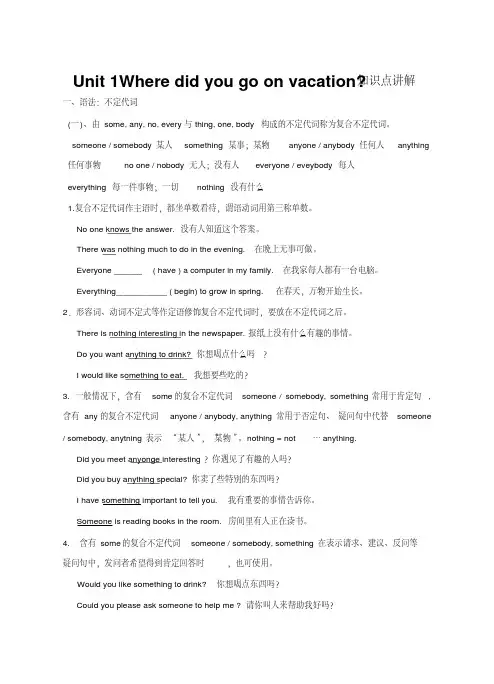
Unit 1Where did you go on vacation?知识点讲解一、语法:不定代词(一)、由some, any, no, every与thing, one, body 构成的不定代词称为复合不定代词。
someone / somebody 某人something 某事;某物anyone / anybody 任何人anything 任何事物no one / nobody 无人;没有人everyone / eveybody 每人everything 每一件事物;一切nothing 没有什么1.复合不定代词作主语时,都坐单数看待,谓语动词用第三称单数。
No one knows the answer. 没有人知道这个答案。
There was nothing much to do in the evening. 在晚上无事可做。
Everyone ______ ( have ) a computer in my family. 在我家每人都有一台电脑。
Everything___________ ( begin) to grow in spring. 在春天,万物开始生长。
2.形容词、动词不定式等作定语修饰复合不定代词时,要放在不定代词之后。
There is nothing interesting in the newspaper.报纸上没有什么有趣的事情。
Do you want anything to drink?你想喝点什么吗?I would like something to eat. 我想要些吃的?3. 一般情况下,含有some的复合不定代词someone / somebody, something常用于肯定句,含有any的复合不定代词anyone / anybody, anything常用于否定句、疑问句中代替someone / somebody, anytning表示“ 某人”,“某物”。
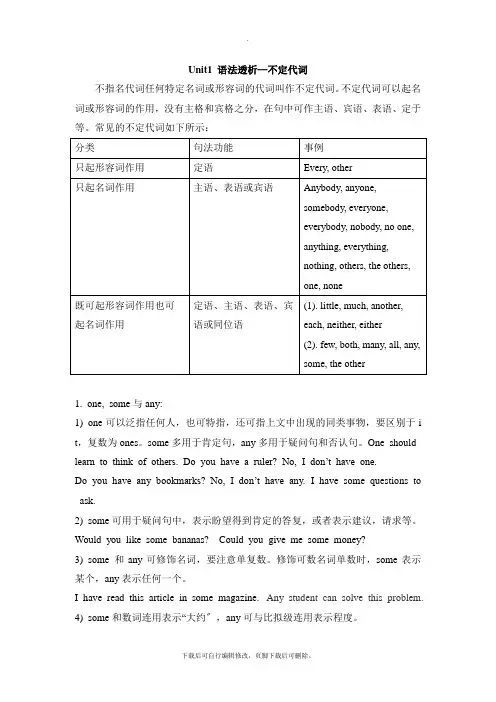
Unit1 语法透析—不定代词不指名代词任何特定名词或形容词的代词叫作不定代词。
不定代词可以起名词或形容词的作用,没有主格和宾格之分,在句中可作主语、宾语、表语、定于等。
常见的不定代词如下所示:1. one, some与any:1) one可以泛指任何人,也可特指,还可指上文中出现的同类事物,要区别于i t,复数为ones。
some多用于肯定句,any多用于疑问句和否认句。
One should learn to think of others. Do you have a ruler? No, I don’t have one.Do you have any bookmarks? No, I don’t have any.I have some questions to ask.2) some可用于疑问句中,表示盼望得到肯定的答复,或者表示建议,请求等。
Would you like some bananas? Could you give me some money?3) some 和any可修饰名词,要注意单复数。
修饰可数名词单数时,some表示某个,any表示任何一个。
I have read this article in some magazine. Any student can solve this problem.4) some和数词连用表示“大约〞,any可与比拟级连用表示程度。
There are some 3,000 students in this school. Do you feel any better today?2. each和every:each强调个别,代表的数可以是两个或两个以上,而every强调整体,所指的数必须是三个或三个以上。
Each student has a pocket dictionary. / Each (of us) has a dictionary. / We ea ch have a dictionary.Every student has strong and weak points. / Every one of us has strong and weak points.3. none和no:no等于not any,作定语。

八年级英语上册1—2单元必考知识点汇总Unit1Where did you go on vacation?【重点语法】不定代词:不指名代替任何特定名词或形容词的代词叫做不定代词。
用法注意:1. some 和any +可数名/不可数名。
some 多用于肯定句,any多用于否定句、疑问句和条件从句。
有些问句中用some,不用any, 问话者希望得到对方肯定回答。
2. 由some, any, no, every 与body, one, thing构成的复合不定代词作主语时,其谓语动词用三单。
3. 不定代词若有定语修饰,该定语要置于其后:如:something interesting【重点短语】1. buy sth for ab./ buy sb. sth 为某人买某物2. taste + adj. 尝起来……3. nothing...but + V.(原形) 除了……之外什么都没有4. seem + (to be) + adj 看起来5. arrive in + 大地方/arrive at + 小地方到达某地6. decide to do sth. 决定做某事7. try doing sth. 尝试做某事/try to do sth. 尽力做某事8. enjoy doing sth. 喜欢做某事9. want to do sth. 想去做某事10. start doing sth. 开始做某事=begindoing sth.11. stop doing sth. 停止做某事区分:stop to do sth. 停下来去做某事12. dislike doing sth. 不喜欢做某事14. so + adj + that + 从句如此……以至于……16. tell sb. (not) to do sth. 告诉某人(不要)做某事17. keep doing sth. 继续做某事18. forget to do sth. 忘记去做某事/forget doing sth 忘记做过某事【词语辨析】1. take a photo/ take photos 拍照quite a few+名词复数“许多…”2. seem + 形容词看起来…... You seem happy today.seem + to do sth. 似乎/好像做某事 I seem to have a coldIt seems + 从句似乎..…. It seems that no one believe you. seem like ... 好像,似乎….. It seems like a good idea.3. arrive in +大地点= getto= reach+地点名“到达......”arrive at +小地点(注:若后跟地点副词here/there/home, 介词需省略,如:arrive here; gethome)4. feel like sth 感觉像…feel doing sth. 想要做某事5. wonder(想知道)+疑问词(who, what, why)引导的从句。
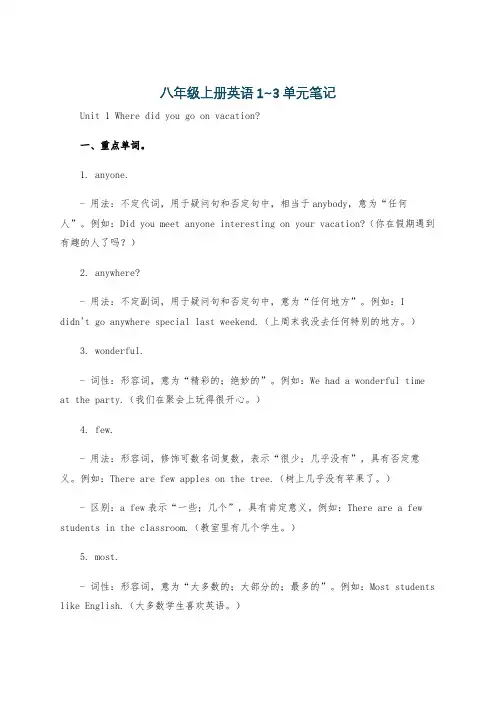
八年级上册英语1~3单元笔记Unit 1 Where did you go on vacation?一、重点单词。
1. anyone.- 用法:不定代词,用于疑问句和否定句中,相当于anybody,意为“任何人”。
例如:Did you meet anyone interesting on your vacation?(你在假期遇到有趣的人了吗?)2. anywhere?- 用法:不定副词,用于疑问句和否定句中,意为“任何地方”。
例如:Ididn't go anywhere special last weekend.(上周末我没去任何特别的地方。
)3. wonderful.- 词性:形容词,意为“精彩的;绝妙的”。
例如:We had a wonderful time at the party.(我们在聚会上玩得很开心。
)4. few.- 用法:形容词,修饰可数名词复数,表示“很少;几乎没有”,具有否定意义。
例如:There are few apples on the tree.(树上几乎没有苹果了。
)- 区别:a few表示“一些;几个”,具有肯定意义。
例如:There are a few students in the classroom.(教室里有几个学生。
)5. most.- 词性:形容词,意为“大多数的;大部分的;最多的”。
例如:Most students like English.(大多数学生喜欢英语。
)- 用法:还可作名词,意为“大部分;大多数”。
例如:Most of the time, I stay at home.(大部分时间,我待在家里。
)6. something.- 用法:不定代词,用于肯定句中,意为“某事;某物”。
例如:I have something important to tell you.(我有重要的事要告诉你。
)- 注意:形容词修饰something时,要后置,如something interesting(有趣的事)。
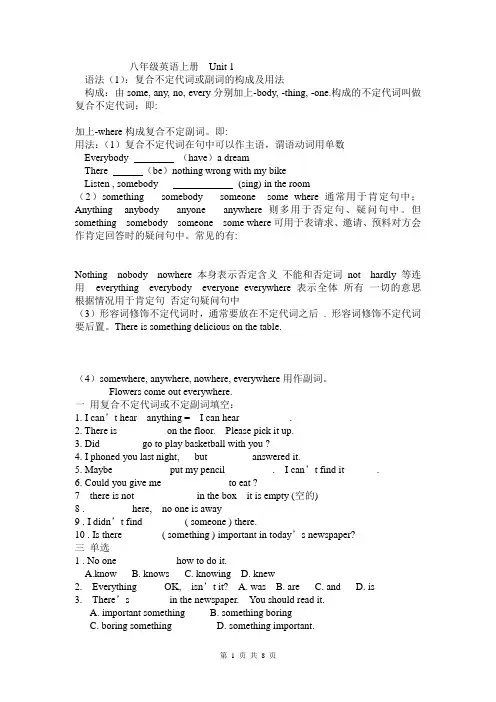
八年级英语上册Unit 1语法(1):复合不定代词或副词的构成及用法构成:由some, any, no, every分别加上-body, -thing, -one.构成的不定代词叫做复合不定代词;即:加上-where构成复合不定副词。
即:用法:(1)复合不定代词在句中可以作主语,谓语动词用单数Everybody (have)a dreamThere (be)nothing wrong with my bikeListen , somebody (sing) in the room(2)something somebody someone some where 通常用于肯定句中;Anything anybody anyone anywhere则多用于否定句、疑问句中。
但something somebody someone some where可用于表请求、邀请、预料对方会作肯定回答时的疑问句中。
常见的有:Nothing nobody nowhere 本身表示否定含义不能和否定词not hardly 等连用everything everybody everyone everywhere 表示全体所有一切的意思根据情况用于肯定句否定句疑问句中(3)形容词修饰不定代词时,通常要放在不定代词之后. 形容词修饰不定代词要后置。
There is something delicious on the table.(4)somewhere, anywhere, nowhere, everywhere用作副词。
Flowers come out everywhere.一用复合不定代词或不定副词填空:1. I can’t hear anything = I can hear ________ _.2. There is _________ on the floor. Please pick it up.3. Did ______ _ go to play basketball with you ?4. I phoned you last night, but ________ answered it.5. Maybe _________ put my pencil _________. I can’t find it ______.6. Could you give me ___________ to eat ?7 there is not __________ in the box it is empty (空的)8 . _________here, no one is away9 . I didn’t find _____ ( someone ) there.10 . Is there ______ _( something ) important in today’s newspaper?三单选1 . No one ________ how to do it.A.knowB. knowsC. knowingD. knew2. Everything_____ OK, isn’t it? A. was B. are C. and D. is3. There’s________in the newspaper. You should read it.A. important somethingB. something boringC. boring somethingD. something important.4.There is _______ in today’s news you don’t need wacth itA. new something B .anything newC . something newD .nothing new13 ---- Did you buy ______ special? ---- No, I didn’t.A. somethingB. some thingsC. anything15 ________ ready now, let’s begin.A.Everything isB.Something are C .Nothing are D.Anything is16.I’m free now, I have _________ to do .A.EverythingB.Something C .Nothing D.Anything语法(2)一般过去时1.一般过去时用法:一般过去时表示过去某时间发生的动作或存在的状态或过去经常性发生的事作,常和过去时间状语连用:yesterday, last night ,two days ago,in 2000, at that time, when 等引导的含过去时的句子。
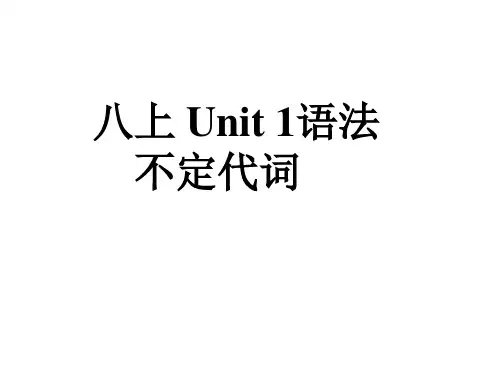
人教新目标英语八年级上册unit1-Unit4单元重点知识复习人教新目标英语八年级上册Unit1 & Unit2 知识点汇总一.Unit1 语法“复合不定代词的用法”1.复合不定代词的构成。
指物:something everything anything nothing指人:someone everyone anyone no onesomebody everybody anybody nobody2. 复合不定代词的用法:①anything , anyone, anybody 常用于否定句及一般疑问句;当anything 表示“任何事”,anyone, anybody 表示“无论谁,任何人”时,用于肯定句。
I don’t want to talk to anyone now. 用于否定句。
Can I ask anyone who knows the answer? 用于一般疑问句。
Anyone knows the answer must leave the classroom. 表示无论谁,用于肯定句。
What would you like to drink? Anything is ok. 表示任何东西,用于肯定句。
②当复合不定代词做主语时,谓语动词用单数。
Everyone here is from China.Everything begins to grow when Spring comes.③形容词放在复合不定代词之后。
Would you like to buy anything special?Can I meet anyone interesting?④当表示请求,邀请,提出建议时,用something, someone, somebody.Would you like something to eat?Why not ask someone special?Why didn’t you buy something for your mother?Unit2 语法“频率副词”How often 常用于对频率的提问,意为“多长时间一次”,其答语可以是once/ twice / three times a week; always/ usually/ often/ sometimes/ hardly ever/ never 等表示时间频率的副词及短语。
Unit 1 Where did you go on vacation?语法聚焦(1)复合不定代词不指明代替任何特定名词的代词叫作不定代词。
复合不定代词是由some-, any-, every-, no-加上-one, -body, -thing等所组成的不定代词。
包括:这些复合不定代词具有名词性质,在句中可用作主语、宾语或表语,但不能用作定语。
使用时注意以下几点:①指代对象不同(辨析:some-, any-)②含some-和any-的复合不定代词的用法区别③复合不定代词的数❖复合不定代词都具有单数的含义,当它们充当句子的主语时,其后的谓语动词用单数形式。
例:Is everyone here today? 今天每个人都到了吗?Nothing is difficult if you put your heart into it. 世上无难事,只怕有心人。
④复合不定代词的定语需后置,即放在复合不定代词的后面。
例:Can you tell something interesting? 你能讲些有趣的事情吗?(2)一般过去时(I)①一般过去时的用法一般过去时用来描述过去发生的动作或存在的状态。
常和一般过去时搭配的标志性的时间状语有yesterday, last week, in the past等。
例:They stayed at home yesterday. 昨天他们待在家里。
②一般过去时的三种句式结构:③一般过去时的句式变化❖be动词的一般过去时的句式变化❖there be句型的一般过去时的句式变化:❖行为动词的一般过去时的句式变化④动词的过去式的变化规律包括规则变化和不规则变化两种。
❖规则变化通常以-ed结尾。
具体如下:❖不规则变化的动词有许多,常见的有:(3)一般过去时(II)侧重行为动词的一般过去时的特殊疑问句①对人物进行提问时有两种情况:②对事件、时间、地点、方式等进行提问时,结构为:特殊疑问词+did+主语+动词原形+其他?❖What did he do last night? 昨天晚上他做什么了? (事件)❖When did you meet Lisa? 你是什么时候遇到莉萨的?(时间)❖Where did you go last weekend?上周末你们去哪里了?(地点)❖How did you get to Beijing? 你是怎么到北京的? (方式)❖Why did you want to visit China? 你为什么想去游览中国?(原因)Unit 2 How often do you exercise?语法聚焦❖频度副词:表示动作频率的副词辨析:always, usually, often, sometimes, seldom, neverUnit 3 I’m more outdoing than my sister.语法聚焦:形容词和副词比较级的基本用法大多数形容词(性质形容词)和副词有比较级的变化,用来表示事物的等级差别。
英语八年级上册知识点归纳Unit1 Where did you go on vacation?【重点语法】不定代词:不指名代替任何特定名词或形容词的代词叫做不定代词。
用法注意:1. some 和any +可数名/不可数名。
some 多用于肯定句,any多用于否定句、疑问句和条件从句。
有些问句中用some,不用any, 问话者希望得到对方肯定回答。
2. 由some, any, no, every 与body, one, thing构成的复合不定代词作主语时,其谓语动词用三单。
3. 不定代词若有定语修饰,该定语要置于其后:如:something interesting【重点短语】1. buy sth for ab./ buy sb. sth 为某人买某物2. taste + adj. 尝起来……3. nothing...but + V.(原形) 除了……之外什么都没有4. seem + (to be) + adj 看起来5. arrive in + 大地方/ arrive at + 小地方到达某地6. decide to do sth. 决定做某事7. try doing sth. 尝试做某事/ try to do sth. 尽力做某事8. enjoy doing sth. 喜欢做某事9. want to do sth. 想去做某事10. start doing sth. 开始做某事=begin doing sth.11. stop doing sth. 停止做某事区分:stop to do sth. 停下来去做某事12. dislike doing sth. 不喜欢做某事14. so + adj + that + 从句如此……以至于……16. tell sb. (not) to do sth. 告诉某人(不要)做某事17. keep doing sth. 继续做某事18. forget to do sth. 忘记去做某事/ forget doing sth 忘记做过某事【词语辨析】1. take a photo/ take photos 拍照quite a few+名词复数“许多…”2. seem + 形容词看起来…... You seem happy today.seem + to do sth. 似乎/好像做某事 I seem to have a coldIt seems + 从句似乎..…. It seems that no one believe you. seem like ... 好像,似乎….. It seems like a good idea.3. arrive in +大地点= get to= reach+地点名“到达......”arrive at +小地点(注:若后跟地点副词here/there/home, 介词需省略,如:arrive here; get home)4. feel like sth 感觉像…feel doing sth. 想要做某事5. wonder(想知道)+疑问词(who, what, why)引导的从句。
八上Unit 11.复合不定代词:somebody某人someone某人anybody任何人anyone任何人nobody没人no one没人everybody每个人everyone每个人something某物anything任何事物nothing没有什么everything一切事物①有body和one的只用来指人②有thing的只用来指事物③复合不定代词做主语时,谓语动词用单数形式④somebody,someone,something用于肯定句,anything,anyone,anybody用于否定句,疑问句⑤表示请求、邀请、提建议等带有委婉的语气的疑问句,和希望得到对方肯定答复的疑问句,以及表示反问的问句中,也用somebody,someone,something⑥anything表示“任何事物,无论何事(物)”, anyone,anybody表示“无论谁,任何人”等意义时,他们也可以用于肯定句中。
2. something、anything、nothing、everything+形容词,例如:something special3.quite和very的区别①quite+a/an, a/an+very②quite+ another, a few , a little ,不能用very4.few,a few, little, a little的区别few,可数名词复数,表否定a few,可数名词复数,表肯定little,不可数名词,表否定a little,不可数名词,表肯定5.what about=how about 做…怎么样后面加动词ing形式6.seem和look的区别Seem暗示有一定根据的判断,look指由视觉而得出的印象7.bored形容人无聊或是对。
感到无聊boring形容物无聊或者是使。
感到无聊8.arrive at+小地方arrive in+大地方9.decide to do sth=make up one′s mind to do sth决定做某事10.feel like 感觉像,后面接动词ing形式11.over超过=more than12.enough 足够的,enough+名词副词+enough13.because和because of的区别Because后面接的是一个句子,because of后面接单词或者短语14.below 在…下面,反义词above15.forget to do sth忘记去做某事(这件事还没有做)forget doing sth忘记做过某事(这件事做过了,却忘记了)16.find out找到,发现,强调找的结果;look for寻找,强调找的过程17.so…that…如此…以至于=too … to…=enough …to1. Why not ask to help you?A. everyoneB. anyoneC. someoneD. no one2. --- Does Tom go to school?--- Yes, he is to go to school.A. enough oldB. young enoughC. old enough3. --- What are you doing now?--- I'm watching a football match. It's really (excite).4. She was angry she walked out and closed the door heavily.A. so; thatB. too; andC. very; thatD. such; that5. We didn't go camping last week (because/because of) the rain.1. 解析:somebody,someone,something用于肯定句,anything,anyone,anybody用于否定句,疑问句,但是表示请求、邀请、提建议等带有委婉的语气的疑问句,和希望得到对方肯定答复的疑问句,以及表示反问的问句中,也用somebody,someone,something,故选C。